The Face of Another Read online
Page 6
I resolved to flip a coin. I tossed many times; heads and tails came out a tie.
FORTUNATELY or unfortunately, before coming to a decision on the facial type, there was the task of obtaining a face to use in the finished product. There was nothing to do but buy one from a complete stranger whom I would never see again; but it was a great responsibility psychologically, and I could not bring myself to attempt it until I was cornered. For this, the situation was quite favorable; I was cornered.
I was quite aware that an inevitable ultimatum would be thrust upon me as soon as I finished the work, yet procrastination gave temporary peace of mind, the two poisons cancelling each other. On the first Sunday morning in March I decided at last to go out into the city. I put the equipment for making casts in my briefcase and got on a streetcar.
The cars to the suburbs were rather crowded, but those that were headed downtown were still comparatively empty. Even so, after several months of not exposing myself to strangers, it was torture. Although I thought I was prepared for it, I stood facing the door, unable to turn around to look inside the streetcar. I reflected how absurd it was for me to be buried in my coat collar despite the stifling heat, unable to make the slightest physical movement, like an insect playing dead. How could I strike up a conversation with a stranger in such circumstances? Each time the car stopped I clung to the door handle, fighting my faintheartedness, wanting to return home.
Yet why in heaven’s name was I so frightened? I had not been accused by anyone, yet I shrank back with almost a guilty conscience, as if I were a criminal. If the facial expression were so essential a mask of identity, wouldn’t it be impossible to recognize a voice on the telephone? Couldn’t one say then that in the dark all men fear, suspect, and hate each other? Nonsense! A face that had properly functioning eyes, mouth, nose, and ears would be enough! A face is not something to show off to others, but something that serves one’s self! (No, there was no reason to get upset—a different I began to apologize shamefacedly—I only hesitated to disturb strangers by deliberately showing by expressionless face.) But I wondered if that were really all. With my prescription sunglasses, which were darker than ordinary ones, there was not the slightest reason to worry that someone might feel I was looking at him.
The streetcar turned a corner, and the side where I was standing was struck by the light in such a way that a couple with a child behind me were reflected in the glass of the door. The child, about five, was seated between his two young parents (they were animatedly talking together, pointing to some sort of poster—as I realized later, an advertisement for installment-plan bathtubs) and was just then staring apprehensively at me from under the brim of a navy-blue woolen hat with a ribbon on it. Wonder, fear, discovery, suspicion, hesitation, fascination, curiosity—all were crammed into his little eyes, and he seemed almost to be slipping into some ecstatic transport. I gradually began to lose my composure. The parents were typical, I thought, saying nothing to him nor even admonishing him to behave properly. I suddenly turned my full face toward the child, who clutched his mother’s sleeve; the mother, poking him with her elbow, replied with a scolding.
How would it be if, not saying a word, I were to plant myself in front of the parents and child and, contemptuous of their perplexity, remove my glasses and surgical mask and begin to undo my bandages? Their perplexity would turn to panic and then to entreaty. I would go on, regardless. To heighten the effect, I would rip off the last folds with a flourish. I would put my fingers under the upper edge of the bandage and in a single movement rip it down. But, as I imagined it, the face I displayed would be a completely different thing from my face since the accident. No, it would not only be different from my face; it would be quite unlike any human face. Bronze color, or gold, or a pure, waxy, transparent white would be fitting. But they would have no time to ascertain anything more. There would be no time in their fleeting impression to know whether it was the face of a god or a devil; the three of them would be transformed into stones, or lumps of lead, or even insects. And the other passengers who had witnessed the scene would be transformed with them.…
Suddenly I came to myself—the car had arrived at my station. I felt fatigued and debilitated as I hurried off onto the platform. There was a bench at one end, and I sat down. I wondered if I were being shunned, for not a soul tried to sit down beside me; the bench seemed reserved for me alone. Overcome with contrition, I felt like crying as I vaguely watched the eddying current of travelers.
Apparently I had been too optimistic. In such a cruel, self-centered crowd would there ever be some soft-hearted fellow who would sell me his face? There was little hope. If I did single out one man, the crowd would probably turn its collective glare accusingly upon me. The clock that graced the wall of the station told a time common for all men … what was this lack of concern in people who had faces? Could having a face be such an important requirement? Was being seen the cost of the right to see? No, the worst of it was that my fate was too personal, too special. Unlike hunger, unrequited love, unemployment, sickness, bankruptcy, natural calamity, criminal exposure, my suffering was nothing I endured in common with other men. My misfortune was forever mine alone. Anyone at all could disregard me completely without feeling the slightest twinge of conscience. And I was not even permitted to protest that disregard.
I wondered if I weren’t becoming a kind of monster. Carlyle said that the robe makes the priest and the uniform the soldier; perhaps the face makes the monster. A monster’s face brings loneliness, and the loneliness informs his heart. If the temperature of my freezing loneliness were to drop even slightly, I should become a monster, indifferent to my appearance, and break with a crash all the bonds which bind me to this world. In heaven’s name what kind of monster would I be, what would I do? Just trying to imagine it was so frightful I wanted to scream.
MARGINALIA: The novel about Frankenstein is interesting. When a monster breaks dishes, it is usually laid to the destructive instinct of monsters; but this author explains it otherwise—dishes have the quality of being easily broken. Being a monster, he merely wished to assuage his loneliness, but the brittleness of the object necessarily made him an assailant. And so, as long as there exist such violable things—breakable, crushable, burnable objects, or objects that can bleed and die—the monster can only go on endlessly assaulting them. Basically, there is nothing new in the behavior of monsters, for the monster himself is nothing more than an invention of his victims.
No, I hadn’t screamed, though I thought I had already begun to. Help! Stop looking at me that way! If I’m to be forever stared at like that, I really will end up a monster! At length, unable to stand it, I brushed aside the forest of humanity and, as if taking shelter in some cave, rushed headlong into a nearby movie house, a “market place of darkness”—the only safe place for a monster.
I do not remember what movie was playing. I took an aisle seat in the balcony. The artificial darkness with its lingering warmth crept about me like a muffler. I gradually began to recover my composure, like a mole that has gone to ground. The movie house was an endless tunnel. I imagined that my seat was some speeding vehicle. I dashed along, cutting through the darkness. If I could fly at this speed, I couldn’t be followed by people. I’d give them the slip. I would arrive before them in the world of eternal night. And I’d call myself the king of the land where there are only drops of mist and phosphorescent animalcules and starlight. I took secret pleasure in such fancies, which were like children’s scribblings in public places. It was as if I were secretly eating something. It would not do to ridicule it, no matter how tiny a piece of darkness it was. Considered on a universal scale, this very darkness was an essential element that occupied a greater part of the actual world.
Suddenly the seats in the row in front of me began to shake unnaturally. The suppressed, cynical laugh of a woman rose to me from out of the darkness immediately in front and to the side. A man shushed her, and the shaking stopped. Perhaps no one else noticed,
for the music at full volume made the hall tremble, and the spectators were few. Although it was none of my business, I drew a long sigh of relief. I stared fixedly in the direction of the voices, unable to take my eyes away, try as I might. The screen brightened, and the outlines of two people were distinctly revealed. The fringe of the girl’s hair, turned under in back, in the fashion of a child’s, fell over the collar of her white mohair coat, and a man’s head was lying on her shoulder. But both of them were completely enveloped from the shoulders down in a man’s black overcoat. However were they interlaced together beneath it?
The conspicuous thing was the white nape of the woman’s neck. The white area seemed to melt into the coat collar, which was the same white, and yet it also seemed to come floating out of it. Actually, the woman may have been moving up and down, but it may well have been that my own eyes were giddy and unfocused. However, the man’s form was even more equivocal. The position of his head was such that he seemed to be looking straight at the woman—if he could move his left arm, which was pressed against her, around under her armpit, he would be able to reach her buttocks, I suppose—her free right shoulder dipped sharply down. They could be doing anything. I concentrated my gaze on the right shoulder until my eyes watered. But it was like a picture drawn in India ink on a blackboard. If the shoulder appeared to be undulating, it was because I wanted it to be so; and if it seemed to be doing it rhythmically, it was definitely because I wished it. In short I was apparently infatuated with my own eagerness.
Suddenly the woman gave a loud laugh. I started as if I had been slapped and was seized by the illusion that it was I who was responsible for the unexpected outburst. But actually it was not the woman who had laughed but the loud-speaker behind the screen. An exciting, voluptuous scene was being enacted on the screen, as if in collusion.
A close-up of a woman’s white throat filled the screen. The picture gradually shifted as she violently twisted her neck to the right and left as if in pain, and at length her lips appeared, like piping hot sausages; they were vigorously contorted into a terrible, excessive smile. Then nostrils like cross-sections of squashed rubber hose … eyelids so tightly closed that they seemed lost in bundles of wrinkles. There was a laugh that changed into the raucous breathing of some frantic wild bird.
I was unhappy. Why show a face to such a degree? Originally movies were supposed to be a show in the dark. Since the person looking at them had no face, the one being looked at wouldn’t need one either, I should think, but.…
Actually, however, though actors do take off their clothes, not a single one tries to take off his face. On the contrary, they even appear to consider that a performance centers on the face. Isn’t it much the same as fraud if they deliberately entice spectators into the darkness? Moreover, peeping is a shameful thing, and can you call it wholesome to act out peeping? I wish they would put a stop to such absurd affectation and hypocrisy! (Isn’t it comic for a cripple who has lost his face to be so self-assertive on such a point? Still, the one who best understands the significance of light is not the electrician, not the painter, not the photographer, but the man who has lost his sight in adulthood. There must be the wisdom of deficiency in deficiency, just as there is the widsom of plenty in plenty.)
As if asking for help, I brought my gaze back to the pair in front of me. This time both of them were absolutely quiet and motionless. Why? Had the voluptuous commotion been nothing but my fancy? A sticky perspiration, crawling like a swarm of insects, began to creep out of the gaps in my bandages. Apparently it was not due simply to the excessive warmth. Something like pepper pricked and tingled in the pores of my whole body. (The deception was perhaps not the darkness but rather my own face!) If at this instant the lights in the hall were suddenly to be turned on, doubtless I would at once be ridiculed and sneered at by the spectators as an intruder.…
Screwing up my courage, I decided to go outside. Yet I couldn’t positively say that seeking this refuge had been completely futile. I had come to feel more defiant than before; in other words, I had to this extent reconciled myself to the world.
AT LENGTH the morning drew to an end. The street in front of the station took on its usual holiday animation, and an almost unbroken stream of people swarmed by. Swallowed up in the current, I continued to walk for about an hour, battling the stares that pestered me like flies. Walking is sometimes considered to have a spiritual effect. For example, military marching is done in formation, columns of two or four, each soldier supplying two legs to maintain that formation. Although the men despair at having lost face and heart, they seem to get an innocent sense of peace in the rhythm of marching. Actually, during long marches it is not at all uncommon for men to experience erections.
Forever chasing the flies away was not going to be much help. Rather, I would have flit covetously among the crowd with the many-faceted eyes of a bluebottle. I would have to find some person who looked as if he might sell me the surface of his face. Sex: male.… Possessor of a smooth skin, as much as possible without characteristic markings.… Since it will be flexible, size or looks are unimportant.… Age: thirty to forty.… A forty-year-old man who would agree to such a requirement for money might possibly have rather pocked and unacceptable skin. Actually I was looking for someone around thirty, I suppose.
I tried to pull myself together, but the effort flickered like a light bulb beginning to burn out: it was difficult to keep up the resolve. Furthermore, although the people walking along the streets were strangers to each other, they formed a tight chain, like some organic composition, and I could not squeeze in. Could sharing ordinary, normal faces forge such a strong bond among them? Moreover, even the things they wore matched. The mass-produced patterns of today called fashion. Is that a negation of the uniform, for heaven’s sake, or simply a new kind of uniform? From the standpoint of continuous change, it probably is the negation of the uniform, I suppose; but considering that this negation is brought about collectively, it may indeed be considered very much a uniform. Perhaps it’s the spirit of today. And because I am against this spirit, I am a heretic. Although my researches bolstered the part of this fashion made with synthetic fibers, not even that would permit me to associate with the crowd; perhaps they thought that a man without a face would be without a heart, too. It was as much as I could do just to keep walking.
If I were stupid enough to try addressing someone among them, even my remote contact with those around me would be sundered at once as easily as a piece of shoji paper. I would be drawn into the midst of the unrelenting crowd and pressed to answer questions about the grotesqueness of my mask. A half-dozen times I crossed and recrossed the street in front of the station, constantly being warned. No, I was not imagining things. In spite of the congestion, pockets of space opened around me, like quarantined areas; not once had I rubbed shoulders with anyone.
It was like being in prison, I thought. A prison’s oppressive, constraining walls, its iron bars, all become burnished and pellucid mirrors reflecting the inmate. The torment of imprisonment lies in not being able to escape from oneself at any time. I too was wretchedly floundering around, tightly closed into the bag of myself. My impatience became irritation, irritation became a dark anger; then suddenly it occurred to me to try a public restaurant in a department store. It seemed about time to eat … perhaps because I was hungry. But the idea had far more challenging implications. With the intuition of a cornered man, I had succeeded in finding the tear in the bag that confined me. Don’t we reveal our weaknesses—solitude, loneliness, defenselessness—and aren’t we most particularly vulnerable when we are engaged in sleep, or evacuation, or eating? Department store restaurants are famous for their menu of solitude.
I stepped off the elevator, into an exhibition area behind which lay the restaurant. The words of a huge sign suddenly leapt out at me: EXHIBITION OF NOH MASKS. I stood for an instant rooted to the spot and then began to back away in confusion. This must have been a coincidence. I immediately thought that if I were
to back out now I would be much teased for it, and so, though there was a roundabout way to the restaurant, I walked straight into the exhibition area.
I felt as tense as a coiled spring as I headed for the restaurant. Perhaps I wanted to take a preliminary look around before the challenge. Even so, a masked man looking at Noh masks was an unusual combination. If necessary, I was prepared to jump through a hoop of fire.
But unfortunately so few people were going into the exhibition that my enthusiasm was dampened. As a result, I decided lukewarmly to make a round of the exhibit as if I were interested. I anticipated nothing special. There was a big difference between a Noh mask and the mask I sought. I needed something to clear the obstruction of the scars and restore the roadway to other people, while the Noh mask rather seemed bent on rejecting life. The moldy smell that filled the exhibition room, for example, a sort of atmosphere of decadence, was good proof of that.
Of course, it wasn’t that I was incapable of understanding that there was a kind of refined beauty in the Noh mask. What we call beauty is perhaps the strength of our feeling of resistance to destructibility. Difficulty of reproduction is the yardstick of the degree of beauty. Thus thin plate glass, if it could not be mass produced, would surely be considered the most beautiful thing in the world today. Even so, the mystery is that man has to seek such rare refinement. The demand for a mask, practically speaking, stems from a desire on the part of those who are not satisfied with, who want something more than, a mere living actor’s expression. If this were true, what would be the need of deliberately stifling expression?
Suddenly I halted in front of a woman’s mask. It was displayed against the surface of a pleated partition connecting two walls. Hung on a background of black cloth, in a wooden frame painted white like a railing, it suddenly raised its face as if answering my gaze. Quite as if it had been waiting for me, a smile seemed to break out over the whole face, and.…

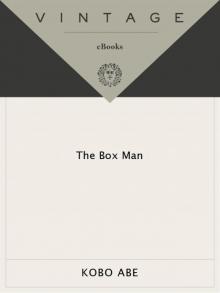 The Box Man
The Box Man Beasts Head for Home
Beasts Head for Home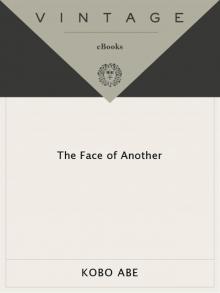 The Face of Another
The Face of Another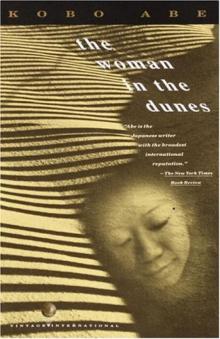 The Woman in the Dunes
The Woman in the Dunes Secret Rendezvous
Secret Rendezvous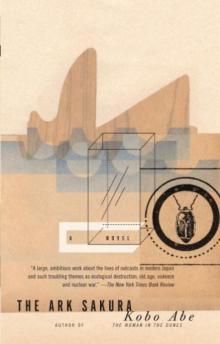 The Ark Sakura
The Ark Sakura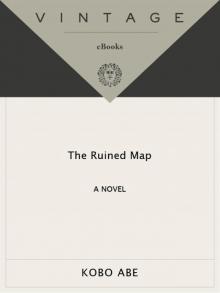 The Ruined Map
The Ruined Map